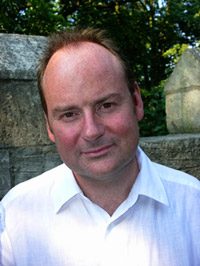Games enthusiasm could benefit society and science
Posted on 23 January 2014
The Game Intelligence event on Wednesday, 12 February marks the official launch of a new research project, New Economic Models and Opportunities for digital Games (NEMOG). NEMOG aims to use games and game ideas in creative new ways, yielding additional social benefits from the UK games industry – the third largest in the world - and is analysing new business models that could be used to achieve this.

Charles Cecil MBE (credit: Jon Jordan)
The event features two influential keynote speakers from the games industry: California-based Jeffrey Lin, Lead Designer of Social Systems at Riot Games, and Charles Cecil MBE, Founder and Managing Director at Revolution Software.
Jeffrey Lin is a key member of the player behaviour team at Riot Games, ensuring the 32m monthly active League of Legends players enjoy a positive experience as part of a fair online community. He will explain how ‘big data’ can be used to design game systems and enhance and enable sportsmanship in online games.
Revolution Software specialises in adventure games (Broken Sword, Lure of the Temptress). Its founder Charles Cecil will discuss business models for games, particularly Revolution’s success with crowdfunding.
Professor Peter Cowling, from the University of York’s Department of Computer Science and the York Centre for Complex Systems Analysis (YCCSA), leads the NEMOG project. He said: “The digital games market is an enormous and fast-growing industry with extraordinary impact, contributing over £3bn a year to the British economy.
“We are looking at how we can harness the widespread enthusiasm for digital games to contribute to advances in society and science. For example, games can be used to test economic theories by analysing the artificial economies in online games, or as a means of collecting data for scientific investigations. We only need to persuade a small fraction of the games industry to consider the potential for social and scientific benefit to achieve a massive benefit for society.”
The NEMOG project is a partnership between the Universities of York, Durham and Northumbria; Cass Business School, City University London; and games companies and industry network associations.
-feat.jpg)
Jeffrey Lin (credit: Riot Games)
Funded by the Engineering and Physical Sciences Research Council (EPSRC) and the Economic and Social Research Council (ESRC), the NEMOG research consortium is examining the current and future state of the industry through sectoral analysis. The consortium is investigating ways of innovating new business models to create commercial, social and scientific value from games. It is also looking at how data mining techniques can be used to analyse gameplay data and understand game players in unprecedented detail.
Professor Feng Li, Associate Dean for Research & Enterprise and Professor of Information Management, at Cass Business School, said: “We are looking at games that go beyond the realm of digital entertainment to address social and scientific objectives. Developing robust and sustainable business models is a key part of the project.
“We are particularly interested in new products with operational scalability, which have the potential for significant long-lasting impacts. New strategies and business models in the digital economy is one of our academic strengths at Cass Business School. With our location close to both the City of London and the London Tech City, we are in a unique position to leverage our connections with both for this project.”
Kiran Fernandes, Professor of Operations Management and Head of Department of Management, Durham University Business School, said: “The use of digital platforms for wider social benefits has become increasingly important over recent years. Gamification has provided a fresh and engaging platform for companies to do this.
“Although still in its infancy, it is predicted that by 2015 gamification will be a primary mechanism by which event organisers engage and gather data from their audiences. We are excited to be bringing together representatives from industry, policy and academia, to present to them a new set of ideas and opportunities.”
Every action in an online game, from an in-game purchase to a simple button push, generates a piece of network data, providing an enormous source of information about player behaviours and preferences. NEMOG will explore what online data is available now and might become available in the future, investigate the issues around gathering such data, and develop new algorithms to "mine" that data to better understand game players as an avenue for making better games, societal impact and scientific research.
The official launch of NEMOG will take place at the Ron Cooke Hub, University of York on Wednesday, 12 February. Anyone working in the digital games industry who is interested in attending the free event can register online at www.nemog.org. To find out more, contact Sarah Christmas, NEMOG Administrator, on 01904 325334 or email nemog@york.ac.uk
Notes to editors:
- Key members of the New Economic Models and Opportunities for Digital Games (NEMOG) research consortium include Professor Peter Cowling (University of York), Professor Feng Li (Cass Business School), Professor Kiran Fernandes (Durham University), Dr Daniel Kudenko (University of York), Dr Ignazio Cabras (Northumbria University), Dr Sam Devlin (University of York), Dr Alberto Nucciarelli (Cass Business School) and Dr Nicholaos Gougamais (Northumbria University).
- More information about the University of York’s Department of Computer Science at www.cs.york.ac.uk
- More information on the York Centre for Complex Systems Analysis (YCCSA) at www.york.ac.uk/yccsa/
Contact details
Keep up to date
Subscribe to news feeds
